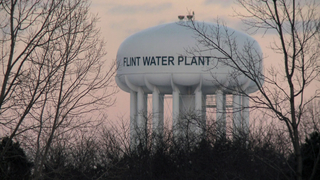
Guests
- Edward Pinkneyhead of the Benton Harbor Community Water Council and the executive director of the Black Autonomy Network Community Organization.
- Mona Hanna-Attishapediatrician, professor at Michigan State University College of Human Medicine in Flint and director of the Pediatric Public Health Initiative.
Residents of Benton Harbor, Michigan, are calling for immediate action on replacing the city’s lead pipes, which have endangered their drinking water. Since 2018, tap water in the predominantly Black city has contained lead levels up to 60 times the federal limit. Yet government officials have only addressed the toxic contamination as an urgent crisis in recent days. Dr. Mona Hanna-Attisha, a pediatrician who exposed a similar water crisis in the neighboring city of Flint, sees parallels between the two emergencies. “Every day that goes by when there is lead in the water is one day too long for the children of Benton Harbor,” she says. Reverend Edward Pinkney, president of the Benton Harbor Community Water Council, emphasizes that racism plays a major role in the government’s slow response. He says, “Since it’s Benton Harbor, a Black city, they figure this can continue.”
Transcript
AMY GOODMAN: This is Democracy Now!, democracynow.org, The War and Peace Report. I’m Amy Goodman.
Officials in Michigan have warned residents in the predominantly Black city of Benton Harbor not to use tap water for drinking, cooking or brushing their teeth, due to lead contamination. Tap water in the city has contained lead levels up to 60 times the federal limit since 2018. Advocates are calling for officials to declare a state of emergency and for the EPA to intervene. Free cases of water are being given out to households, but some distribution sites don’t have enough water to meet the demand. Michigan Governor Gretchen Whitmer has now vowed to remove and replace lead pipes in the city within 18 months. Up until recently, Whitmer had been saying the process could take five years.
The situation in Benton Harbor is being compared to the water crisis in Flint, Michigan, that began in 2014 when the city’s unelected emergency manager, appointed by then-Republican Governor Rick Snyder, switched the city’s water supply to the Flint River as a cost-saving measure. The move has been linked to at least 12 deaths, from an outbreak of Legionnaires’ disease, and widespread lead poisoning in residents, including children, in the majority-Black city of Flint. The water crisis in Benton Harbor comes as Congress is considering a $1 trillion bipartisan infrastructure bill that includes $55 billion to replace lead pipes and for other measures to ensure drinking water supplies.
We’re joined now by two guests. Dr. Mona Hanna-Attisha is a Flint-based pediatrician whose 2015 study revealed Flint’s children had high levels of lead in their blood. And in Benton Harbor, Michigan, we’re joined by the Reverend Edward Pinkney, president of the Benton Harbor Community Water Council, executive director of the Black Autonomy Network Community Organization.
Reverend Pinkney, let’s begin with you. Can you lay out the extent of the problem? You had top state officials, like the governor, coming in last Thursday to say they will deal with this. But this is a story, once again, like Flint, that has been going on for years.
REV. EDWARD PINKNEY: Absolutely. And let me start at the very beginning, how all this came about. How it came about was that one of the Benton Harbor community members of the council took two jugs of water to the mayor of Benton Harbor to let him know that in this one square block everybody’s water was this color. And when they took it, he refused to even look at it. Once he didn’t look at it, Emma Kinnard brought it to me, and I sent it to the University of Michigan biological lab to have it tested. And it came back with over 300 parts per billion of lead. That’s how all of this started.
We went out and helped the city of Benton Harbor to test the water to make sure they have at least 60 samples. They had never had 60 samples at this time, so we went out and did it for them, which is so, so important because if they don’t have 60 samples, they’ll just be out of compliance with the state. That’s all it means. But if they have 60 samples, they can say that — you know, whether the water is bad or not. So, that was crucial.
For three years, it was like this. Nobody said nothing. The elected officials, the governor officials, the EPA — nobody said a mum word. But what happened on September the 9th, we filed a petition. That petition was a — what do you call — a state of emergency with the federal government. And after filing that, they started to move, and which was so, so important because if we had not filed that petition, you know, we wouldn’t be talking today, and, yet and still, it would maybe be another three or four years that the residents of Benton Harbor would be drinking that tainted water, which is so, so crucial. The governor would have did exactly nothing without that petition. And also, this is an election year for her, so that is crucial.
And let me say something about the bottled water that’s being distributed. Thirty thousand cases is being distributed in Benton Harbor, but 25,000 is going to the surrounding areas. They are the ones coming to pick the water up. So, that is a major crisis that we need to talk about also. You can’t say that she’s putting 30,000 cases of water into Benton Harbor, when she’s allowing people from the surrounding areas to come and pick the water up. And I’m very, very, very upset about that. I cannot believe that they didn’t have a better system to make sure that everybody in Benton Harbor get fresh water.
AMY GOODMAN: Dr. Mona Hanna-Attisha, you were the one who blew open the story of the lead poisoning of the people of Flint. We’re talking again about an overwhelmingly Black city, Flint and Benton Harbor. Can you talk about what you feel the state and the federal government needs to do? And describe the crisis right now in Benton Harbor.
DR. MONA HANNA-ATTISHA: Yeah. First off, Amy, it’s great to be here with you, and it’s great to be here with Reverend Pinkney.
REV. EDWARD PINKNEY: Thank you.
DR. MONA HANNA-ATTISHA: He has done heroic work to elevate this issue.
So, what the state and the federal government needs to do — and I was one of those folks that signed that petition — is to share, very clearly and transparently, in many different ways, that the water is not safe right now, and to provide alternative water. And right now that’s bottled water. And, you know, maybe it needs to be home delivered. We need to work with the community. We need to work with Reverend Pinkney and the folks on the ground to make sure that people have access to bottled water, because every day that goes by when there is lead in the water is one day too long for the children of Benton Harbor.
AMY GOODMAN: So, describe what happened in Flint, the years, as you exposed this. This was under a Republican administration, you know, under Governor Snyder. And then talk about what’s happening in Benton Harbor.
DR. MONA HANNA-ATTISHA: Yeah. So, Flint, as you mentioned earlier, was under this bizarre state of usurped democracy: We were under emergency management. And their goal was austerity, to save money. And that’s how our water source was changed in Flint from the Great Lakes to the Flint River without proper treatment. So, for about a year and a half, the people of Flint, like the people of Benton Harbor, were saying, “Hey, there’s something wrong with my water. Please do something with my water.” Moms would bring jugs of brown water to town hall meetings, and they would be dismissed and denied for a long time, until, finally, we brought the science to the table that kids were in harm’s way. And it took a while. There was a bit of backlash, but the state finally conceded.
And now in Benton Harbor, we have amazing folks that are also sharing, “Hey, there’s something wrong with our water.” And also, interestingly, Benton Harbor was also one of the cities in Michigan that lost democracy. It was also another city that was under emergency management. And if you remember, in Michigan, at one point, half of our African American population was under emergency management, where there was unelected, unaccountable officials that were running these cities. And, you know, let this be another lesson of the consequences of taking away people’s democracy and taking away their voices. It impacts health.
So, in Benton Harbor, there wasn’t a water switch. It’s hard to tell when their crisis happened. But for six consecutive sampling periods, which is about three-and-a-half years, the lead in their water has exceeded the EPA action level. And that EPA action level is not even a health-based standard. It’s just a compliance standard. So that’s even an underestimation of the amount of lead that has been in the water and the potential harm that it could be doing.
AMY GOODMAN: Reverend Edward Pinkney, if you can talk about the two towns? Alex Kotlowitz eloquently wrote about it years ago in a book called The Other Side of the River: A Story of Two Towns, a Death, and America’s Dilemma. It’s a story of overwhelmingly African American Benton Harbor and the white, wealthier St. Joseph. Talk about the difference.
REV. EDWARD PINKNEY: There’s a major difference here. When you talk about St. Joseph, Michigan, they have nice, clean water. But at one time, they got their water from the city of Benton Harbor. Let me say this: Racism plays a major part in this. And when I talk about it, can you imagine a white woman with a baby getting on the camera in front of the news media, telling people that they had 889 parts per billion of lead in their water, and it’s killing her baby? They would send out the Army, FEMA, the Pentagon and all these different things.
But since it’s Benton Harbor, a Black city, that they figure that, you know, that this can continue. If we had not filed that petition — and I thank Dr. Mona for partnering, for joining us with that, because that was tremendous — we wouldn’t even be talking today about this, because this is one thing that they allow. Flint, Michigan, Benton Harbor, in their eyesight, it’s all right.
But it’s not all right. We have to change and let them know that no city in the United States of America should be suffering from water. Water is life. You cannot live without water. And the racism that exists on this part is outstanding, because nobody really cares. You see, nobody cares about Benton Harbor. Nobody cares about Flint, Michigan. Flint, Michigan, is still having the same problem they had years ago. But we have to make sure that we’re doing what we’re supposed to do to make sure this never, ever, ever happens to another city.
AMY GOODMAN: Many top state officials were indicted for what happened in Flint. For example, the governor, Rick Snyder, ultimately was indicted. Dr. Mona Hanna-Attisha, if you can talk about what took place? And explain what lead poisoning does and why children are particularly vulnerable.
DR. MONA HANNA-ATTISHA: Yeah, I’l start with that. So, you know, when I heard about the possibility of lead in Flint’s water, that’s when my heart stopped, my life changed, because, as a pediatrician, we know what lead does. It’s a irreversible, potent neurotoxin. It especially impacts developing children. It erodes cognition, so actually lowers IQ levels. It impacts behavior and development, causing learning problems, attention problems, focusing problems, causes growth problems and hearing problems. And we now know that kids exposed to lead can present later on in life with things like high blood pressure and kidney disease and gout, and even things like early dementia and Alzheimer’s. Incredible science has taught us that — especially over the last few decades, that there is no safe level of lead — none, zero. Levels we thought were OK, you know, decades ago, we now know are not OK.
And what we’re supposed to be doing, what the CDC and the American Academy of Pediatrics and the World Health Organization recommend, is this concept of primary prevention. We are supposed to find lead in the environment before children are exposed. Yet for decades, and maybe centuries, we have failed at this. We have lacked the political will to dig up those lead pipes, to fix up the old homes where there’s still lead paint, to clean up the soil where we have remnants of lead in gasoline, and protect our children, and especially our most vulnerable children.
Lead is a classic form, like Reverend Pinkney mentioned, of environmental racism. And we’ve known that also for decades. It continues to be children who are predominantly poor, but predominantly people of color, who are disproportionately burdened by environmental contamination like lead. Flint kids, just like Detroit kids and Chicago kids and Benton Harbor kids and Philadelphia kids, these are kids that already have higher rates of lead and are also already burdened with so many other toxicities of life that make it hard for them to be healthy and succeed.
So, if we are serious about being antiracist, if we are serious about eliminating inequities, one of the first things that we should be doing is getting rid of the lead in our environment. And I’m hopeful. I am hopeful that the infrastructure bill will finally get rid of these poisonous — and you can think of them as straws, like our children have been drinking through poison straws across this country. You know, Flint was just the tip of the iceberg. And I’ve probably spent half my time working with other communities, because the story keeps repeating. And I hope this story in Benton Harbor is the last story. And we can actually — we can make it the last story if we finally pass the infrastructure bill.
AMY GOODMAN: Well, I want to thank Reverend Edward Pinkney for joining us, president of Benton Harbor Community Water Council. And, Dr. Mona Hanna-Attisha, I’d like you to stay on as we move to the issue of COVID.












Media Options